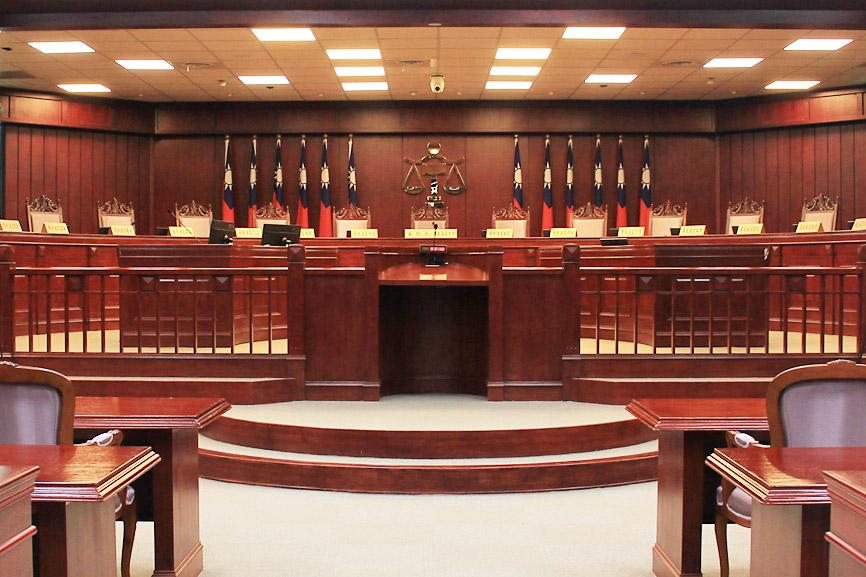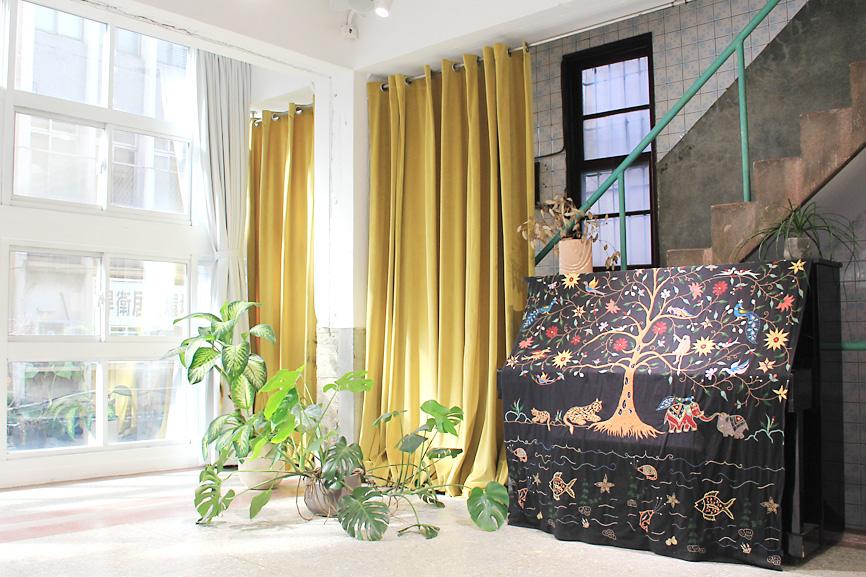More than 70 percent of Taipei’s buildings are four or five-story residential blocks built in the 1960s and 1970s that due to cost considerations and architectural limitations lack elevators, said Open House Taipei chief executive Victor Wu (吳卓昊), as he discussed the city’s inclusion in the annual global architecture festival known as Open House.
Installing an elevator in a residential building immediately increases the price of a unit, which is “something we should appreciate, or we should understand,” Wu, who earned a master’s degree in landscape architecture from Harvard University’s Graduate School of Design, told the Taipei Times.
The Open House festivals, which began in London in 1992 and have spread to more than 40 cities, aim to give the public a chance to explore urban spaces that are normally off-limits to them.

Photo: Sherry Hsiao, Taipei Times
One of the goals of the Open House Taipei weekend is to show visitors how to “read” an architectural project, said Wu, who curated the event.
The weekend, which has been in the planning for more than 18 months, is scheduled for Saturday and Sunday next week and includes 73 sites in Taipei and New Taipei City, ranging from the high-ceilinged halls of the Judicial Yuan offices built during the Japanese colonial era, the Taipei Metro Operations Control Center, interdisciplinary art collective WHYIXD’s studio, Divooe Zein Architects’ Siu Siu Lab of Primitive Senses, to the Kimpton Da An Hotel created by Shanghai-based studio Neri&Hu and the backstage spaces of the National Theater and Concert Hall.
Participants would also be able to have a drink at the members-only Staff Only Club that has been shrouded in mystery since it opened in 2018.

Photo: Sherry Hsiao, Taipei Times
Nearly 500 volunteers are to be on hand to introduce the spaces and conduct guided tours, or lead the lectures, workshops and other programs that some sites are hosting.
While the spaces that require advance registration were fully booked within an hour of reservations opening last month, a majority of the sites are allowing people to line up for entry during the weekend.
CLOSING THE GAP
“What is Taipei?” is the question the inaugural edition of the festival is aiming to address, Wu said.
“I think most Taiwanese are proud of our city in general,” he said. “Like we all know, for example, the MRT system is kind of like one of the best around the world.”
However, besides iconic sites such as the Chiang Kai-shek Memorial Hall or Taipei 101, most Taiwanese do not know what sites in Taipei to introduce to tourists, he said.
This relative lack of familiarity to the built environment in which Taipei urbanites inhabit coincides with what Wu describes as an obvious tendency in the fields of architecture and design for professionals to keep a distance between themselves and the public.
Most architecture studios in Taiwan are not used to promoting themselves, he said.
“They just want to focus on their projects, so that is why there is kind of like a gap,” he said.
Besides the use of technical jargon that might discourage a closer relationship between designers and a lay audience, Wu believes there is a mindset within the industry that “if your project is too easy to understand, then that is kind of like not cool enough.”
He said that he hoped the participation of this year’s set of sites would demonstrate to other places that are reluctant to open their doors to the public the value in doing so, and in initiating a conversation about architecture with the public.
Wu is not the only person who is interested in using Open House Taipei to bridge the gap between professionals and the general population.
When visitors ascend the stairs of the Judicial Yuan’s front entrance at 2pm on Saturday next week, they are to be greeted by Judicial Yuan President Hsu Tzong-li (許宗力).
The gesture is symbolic, Judicial Yuan Secretary General Lin Hui-huang (林輝煌) told the Taipei Times.
The Judicial Yuan’s involvement in Open House Taipei is part of a greater effort to draw the public closer to the nation’s legal system as it prepares to welcome so-called “citizen judges” — or lay judges — who are to serve alongside professional judges starting on Jan. 1, 2023, he said.
LOCAL AND GREEN
With the COVID-19 pandemic preventing people from traveling abroad, Wu said that he has noticed people beginning to re-explore their own cities and the nation.
Owing to Taiwan’s success in containing the spread of COVID-19, Taipei is only one of two cities to hold an Open House event in a fully in-person format this year, he said.
The other is Zurich, Switzerland, he said.
Sian Milliner, who as the head of Open House London oversaw the festival’s transition in September to a hybrid of online and offline events, made a similar observation during an interview via Google Meet.
Encouraged by authorities to walk or cycle rather than use public transportation, Londoners have been “getting out and about and exploring their local area,” she said.
People are “not on the Tube as much and they’re actually looking at their city rather than sitting underground on a train,” she said.
The pandemic has also highlighted the lack of private green space in the city, she said.
“I think everyone is thinking very differently about the city now, which I think is a good thing,” Milliner said. “I think a lot of people who were sort of renting in London and looking at, you know, why am I renting this flat if it has no outdoor space, and no communal gardens, and not enough space to work from home?”
She expects public or communal outdoor space to become increasingly popular in the UK capital.
“I really hope that city planners take this as an opportunity to really evaluate how the city works and what people need,” she said.
PLANNING REQUIRED
To anyone thinking of taking part in Open House Taipei, organizers have two words of advice: Plan ahead.
Wu said his team has received tons of messages from fans asking how they can visit all 73 sites over the two days.
“That’s not gonna happen,” he said.
Wu recommends browsing the event’s Web site (www.opentaipei.org), and building an itinerary based on personal interests.
People should plan on visiting three sites a day, and select two additional sites as backups, he said.
“Open House can be exhausting if you try and do too much,” Milliner said, reminding visitors to factor in transportation time, and to schedule breaks.
“There’s a little bit of something for everybody no matter what they’re interested in,” she said about Open House events.
Milliner, who became involved in Open House almost three years ago, said the London program is never the same from one year to the next.
With changes to the city’s built environment a constant, she said there is always an opportunity for new sites to be included.
For next year’s Open House Taipei, Wu and his team want to explore what he called the concept of “re” — as in reduce, reuse, recycle and renew — and open spaces such as recycling stations, sewage treatment plants and urban renewal sites.
They are already planning for year three.
That is when they want to highlight the changes that have taken place in the city since the start of the pandemic, as well as sites that relate to the social aspect of people’s lives, such as quarantine hotels and co-working spaces, Wu said.
Already on pace to become a staple in the city’s cultural calendar, Open House Taipei might just prove architecture to be one of Taipei’s best-kept secrets.

Taiwan has received more than US$70 million in royalties as of the end of last year from developing the F-16V jet as countries worldwide purchase or upgrade to this popular model, government and military officials said on Saturday. Taiwan funded the development of the F-16V jet and ended up the sole investor as other countries withdrew from the program. Now the F-16V is increasingly popular and countries must pay Taiwan a percentage in royalties when they purchase new F-16V aircraft or upgrade older F-16 models. The next five years are expected to be the peak for these royalties, with Taiwan potentially earning

STAY IN YOUR LANE: As the US and Israel attack Iran, the ministry has warned China not to overstep by including Taiwanese citizens in its evacuation orders The Ministry of Foreign Affairs (MOFA) yesterday rebuked a statement by China’s embassy in Israel that it would evacuate Taiwanese holders of Chinese travel documents from Israel amid the latter’s escalating conflict with Iran. Tensions have risen across the Middle East in the wake of US and Israeli airstrikes on Iran beginning Saturday. China subsequently issued an evacuation notice for its citizens. In a news release, the Chinese embassy in Israel said holders of “Taiwan compatriot permits (台胞證)” issued to Taiwanese nationals by Chinese authorities for travel to China — could register for evacuation to Egypt. In Taipei, the ministry yesterday said Taiwan

Taiwan is awaiting official notification from the US regarding the status of the Agreement on Reciprocal Trade (ART) after the US Supreme Court ruled US President Donald Trump's global tariffs unconstitutional. Speaking to reporters before a legislative hearing today, Premier Cho Jung-tai (卓榮泰) said that Taiwan's negotiation team remains focused on ensuring that the bilateral trade deal remains intact despite the legal challenge to Trump's tariff policy. "The US has pledged to notify its trade partners once the subsequent administrative and legal processes are finalized, and that certainly includes Taiwan," Cho said when asked about opposition parties’ doubts that the ART was

If China chose to invade Taiwan tomorrow, it would only have to sever three undersea fiber-optic cable clusters to cause a data blackout, Jason Hsu (許毓仁), a senior fellow at the Hudson Institute and former Chinese Nationalist Party (KMT) legislator, told a US security panel yesterday. In a Taiwan contingency, cable disruption would be one of the earliest preinvasion actions and the signal that escalation had begun, he said, adding that Taiwan’s current cable repair capabilities are insufficient. The US-China Economic and Security Review Commission (USCC) yesterday held a hearing on US-China Competition Under the Sea, with Hsu speaking on